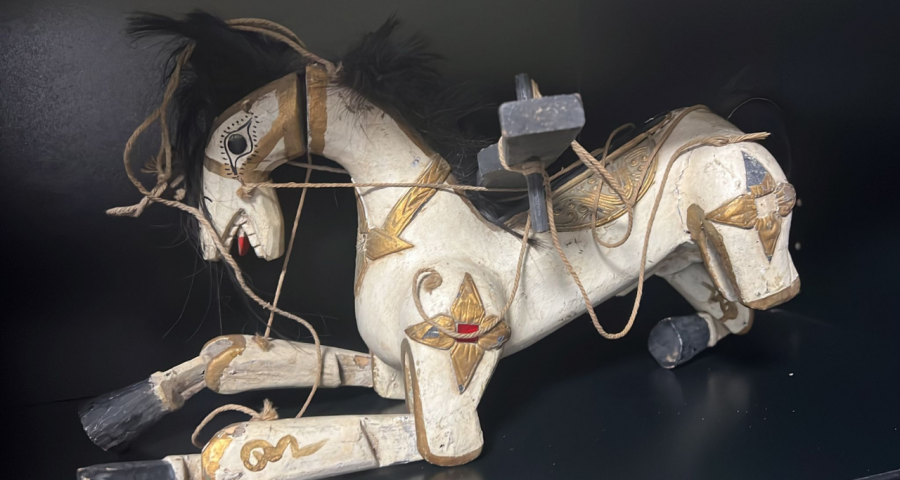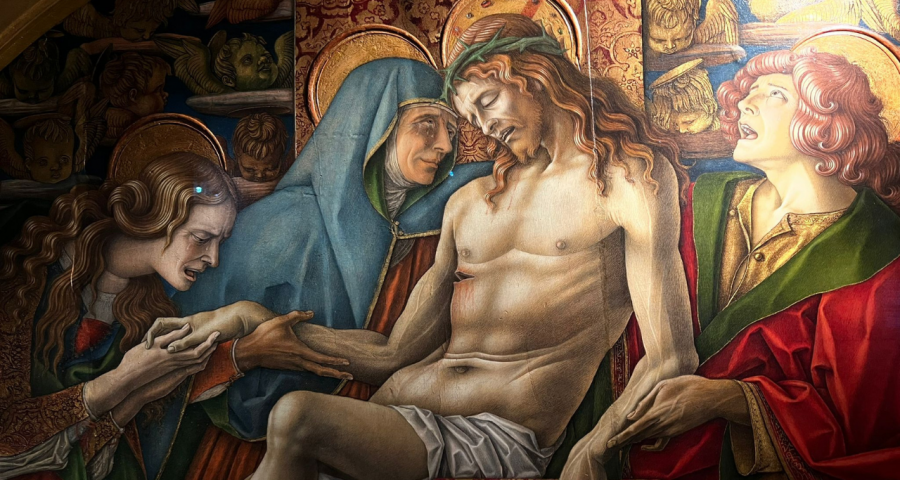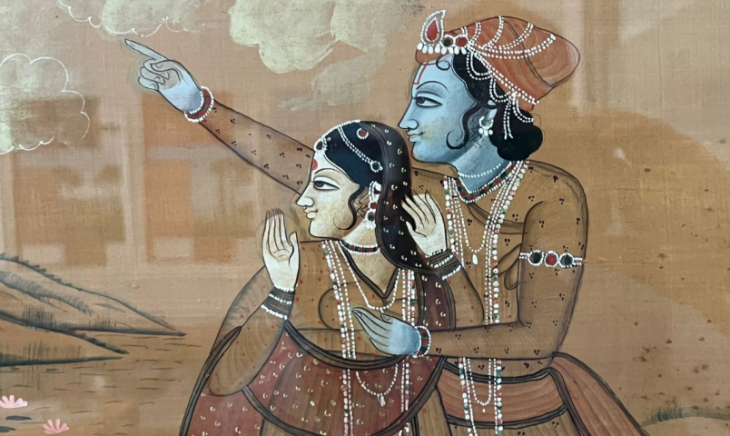The Star of absence/8 - Two eternal lessons: knowing how to wait and knowing how to face a test with dignity
By Luigino Bruni
Published in Avvenire 22/01/2023
Have you thought carefully about what you are exposing yourself to? - Yes, my father, - Scheherazade replied - I know all the dangers that I am facing. If I die, my death will be glorious, but if I succeed in my enterprise, I will render an important service to my people.
One Thousand and One Nights
Esther's beautiful relational strategy leads her to understand what really lies at the heart of the decision of her king and husband, and thereby act by seizing the right moment.
«And being gloriously adorned… She took two maids with her. And upon the one she leaned, as carrying herself daintily. And the other followed, bearing up her train» (Esther Additions 15,2 KJVA).
At the end of her remote dialogue with Mordecai, Esther has now made her choice and, defying a very real mortal danger, she is now preparing to meet King Xerxes, her husband. The additions present in the Greek version (marked depending on the version with the number 15.1, 15.2…15.16) reports details that greatly enrich the narration, including the beautiful relationship of trust between Esther and her maids: «And she was ruddy through the perfection of her beauty, and her countenance was cheerful and very amiable: but her heart was in anguish for fear" (Esther Additions 15,5 KJVA). The biblical author describes the face and the heart to us, the face that everyone would see and the heart that only the author can see, who herein shares a prerogative of God, he who knows of the invisible mysteries of all hearts.
The king sees her. He had not called upon Esther, and we know that her presence could have cost her her life: «Then lifting up his countenance that shone with majesty, he looked very fiercely upon her: and the queen fell down, and was pale, and fainted, and bowed herself upon the head of the maid that went before her» (Esther Additions 15,7 KJVA). Now, in the face of the angry, blazing gaze from the king, that fear in her heart was transferred to her whole body, and so we understand the (beautiful) role of the maids who accompanied the queen. However, here's the first twist: «Then God changed the spirit of the king into mildness, who in a fear leaped from his throne, and took her in his arms, till she came to herself again, and comforted her with loving words and said unto her: “Esther, what is the matter? I am thy brother, be of good cheer: Thou shalt not die, though our commandment be general: come near”» (Esther Additions 15,8-10 KJVA). Instead of condemnation, Esther finds acceptance and tenderness in her husband. Even a pagan king, whom the text describes as easy to manipulate, weak and even cruel, can have a moment of humanity, of mercy, of sweetness. We see examples of this every day. Because just as the good guys are not always, forever good, even "bad guys" are sometimes capable of rising beyond their moral conditioning.
Perhaps this too is part of the image of God not quite erased by the gesture of Cain and his brothers - we had to wait for Xerxes to read a truly humanly beautiful sentence: a husband who defines himself as his wife's "brother", to remind us that fraternity is another tonality acquired within a spousal relationship. Even a villain can surprise us with a gesture of sincere humanity, and it is within this anthropological and ontological aspect that the true possibility of redemption from whatever evil has been done resides. A redemption that every human being receives as a dowry when coming into the world, which is not erased by his or her sins and errors, remaining alive until his or her very the last day: «And so be held up his golden sceptre, and laid it upon her neck, and embraced her, and said: "Speak unto me"» (Esther Additions 5,11-12). «Then said the king unto her: "What wilt thou, queen Esther? and what is thy request? it shall be even given thee to the half of the kingdom”» (The Book of Esther 5,2-3). Thus, Esther is faced with an offer similar to the one Herod will eventually make to the dancing daughter of his wife Herodias, who according to Josephus (Ant. Jud., XVIII, 136) was called 'Salomé'– «Whatever you ask I will give you, up to half my kingdom» (Mark 6,23). However, Esther is the anti-Salomé, because not only is her request a request for life (to save the Jews) and not for death (the head of John the Baptist), but because Esther, unlike Salomé, does not seize that favourable moment of her husband to convince him. Hence, here we find ourselves at the second twist in the chapter, the decisive one.
There are moments when powerful males become vulnerable, and among these is the encounter with female beauty (or at least with eros). The powerful man is then moved, mellows and promises (almost) everything. Usually, these are the right times to act. Generally, but… not always – women, people, can be recognized by how they experience these moments. «“If it pleases the king,” replied Esther, “let the king, together with Haman, come today to a banquet I have prepared for him.” “Bring Haman at once,” the king said, “so that we may do what Esther asks”» (Esther 5,4-5). Why does Esther not take advantage of King Xerxes' good mood – the text shows him to be very moody – and postpone her request until the time of the banquet? With an exercise of literary empathy we can imagine that Esther understands or perceives that that moment of positive intimacy with her husband (who kisses her and touches her neck, there are some quite explicit erotic allusions in the Hebrew text, Esther Additions 5) was not the right moment (kairos) for her request. The fundamental element is in fact the presence of Prime Minister Haman, the one who had actually wanted the extermination and convinced the king to sign the decree. Esther knows that he is the key figure, even though her husband is superior to him, and so she wants Haman to be present at the crucial moment.
An interesting trait of the wisdom of the women of the Bible emerges here. We have encountered it before, in Abigail who manages to avoid David's war against her clumsy husband, in Naomi who teaches her daughter-in-law Ruth how to conquer her future husband Boaz, and in the wise mother of Tekoa (2 Samuel 14,5-7) who convinces David to repeat the "sign of Cain" on her fratricidal son and thus save him. The Bible often shows us the different kind of intelligence of women, characterized by a special intuition for the care of relationships and life that comes before reasons, interests, power, religion, maybe even God - Sarah perhaps would not have left for Mount Moriah with Isaac, and instead would have said to the voice: "You cannot be the true God of life if you ask me to kill my son".
In this episode of Esther, we can surmise a new aspect of this emotional and relational intelligence, particularly valuable when dealing with (male) power. She senses that convincing her husband in that moment of sincere "weakness" would have been the wrong move. That promise would not have been reliable, because the king, who was in direct contact with Haman, an astute man with a strong personality, would not have been able to keep his word. She senses that speaking immediately she would have simply failed in her mission because she would have missed the right moment for her difficult intervention - "There is a time for everything" is not only part of the repertoire of the wisdom of Ecclesiastes, it is the very heart of biblical wisdom, centred on establishing the right relationship at the right time with people and life. It is then that Esther understands that the simultaneous presence of her husband and Haman is the right time and form for her request.
Many actions of salvation do not obtain their objective because we get the timing and the rhythm wrong. A very common mistake in power dynamics is to think that convincing the "most able" is sufficient to achieve a goal, because we tend to think that "in more there is less". So we do everything to reach those in charge directly (the president, the director) and try to convince them with all our means, sometimes we even succeed. However, if the key person was someone else, the process will stall, because the time when those who have been bypassed or ignored will find a way will soon come, with more powerful means than ours, either to change the king's mind or to block the process. If one (or more) specific people are at the centre of a problem, to solve it I must sooner or later, in the right form and at the right time, face those people. Avoiding them or bypassing them by going directly to the top almost inevitably means deluding yourself and heading towards certain disappointment.
Too many good deeds doe not end well due to this sort of “hierarchical naivety”. In other words, we delude ourselves that power follows the organizational chart of the organization, while forgetting two essential socio-anthropological truths: a) a lower-ranking person who, however, holds a share of power, will do everything to block a decision made by a superior when feeling bypassed; b) the "superior" that we contacted has his own very precise "structure of incentive", where avoiding to upset his main collaborators weighs much more heavily than loyalty to that one (perhaps sincere) conversation he had with us. Hence, faced with the potential conflict between being faithful to his word to us, and the smooth running of his office, he will almost inevitably end up preferring the latter.
Therefore, in order to choose the right time and way to act, especially when we are moved by the desire for good (the "children of darkness" know these dynamics very well), we must first study and understand the relational morphology of power and identify where the real knots are, knots that are almost always different from those in the organizational chart and the "job descriptions". And then, pure as doves and shrewd as snakes, act, like Esther. Thus, the king and Haman attend the queen’s banquet and here comes the third twist in the story: a new postponement: «The king again asked Esther, “Now what is your petition? It will be given you”… Esther replied, “My petition and my request is this: If the king regards me with favour and if it pleases the king to grant my petition and fulfil my request, let the king and Haman come tomorrow to the banquet I will prepare for them”» (Esther 5,6-8). For some reason that remains veiled to us, Esther realizes that that first banquet was not the right time or moment to speak.
Beyond any possible psychological reasons, the narrative rhythm of the story gains considerably from this second postponement (never forget that we are inside a form of historical novel). Consequentially, we are gifted with another beautiful episode with Mordecai as the protagonist: «Haman went out that day happy and in high spirits. But when he saw Mordecai at the king’s gate and observed that he neither rose nor showed fear in his presence, he was filled with rage against Mordecai» ( Esther 5,9). Despite the crisis he was facing due to the awareness of the very serious effects that his gesture of dignity had caused his people (extermination), Mordecai is still there, continuing his Stabat. Not only does he not bow down in front of Haman, this time, the Hebrew text adds, as Haman passes «he neither rose nor showed fear », which were the typical gestures of subjects in front of those in power. The pain caused by the effects of his gesture had not convinced him to put an end to it. The edict had been issued, of course, but perhaps there is another message in Mordecai's gesture: when one begins to resist in order to save one's dignity, one must never stop, when one has managed to raise one's head once, one must hold it up, forever.






